Breaking: Student Activists Smear Youngkin's UVA Board Appointee as Racist
University of Virginia alumnus Bert Ellis, who was recently tapped by Governor Glenn Youngkin to sit on the university’s Board of Visitors, was touring his alma mater’s campus with his family in 2020 when they encountered a profane sign hanging on a students’ door.
"F*ck UVA," the sign read.
Outraged that such a message was being conveyed on the campus “Lawn,” which is a UNESCO World Heritage site and part of founder Thomas Jefferson's academical village, Ellis forwarded a picture of the scene to UVA president James Ryan, asking if the display was permissible. Ryan replied, "no" and "I'm on it," Ellis told National Review.
In addition to being generally offensive, the sign also violated school rules. Every Lawn resident signs a contract agreeing to be an "ambassador" for UVA and to abstain from posting signage outside their rooms.
"You can't put a f*ck USA sign on the Washington monument or the Jefferson monument or the Capitol or the White House. Nor can you do it at the Taj Mahal or on the side of the Grand Canyon," he said.
Little did Ellis know that his efforts to protect the integrity of an institution he loved would lead to a vicious smear campaign. Started by progressive student activists, the effort to cast Ellis as a bigot would percolate all the way up to the Washington Post editorial board and threaten his confirmation as a member of the UVA Board of Visitors — a position that requires state legislative approval.
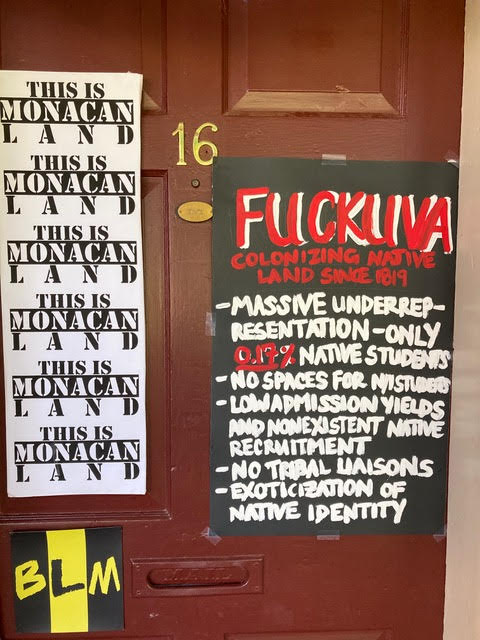
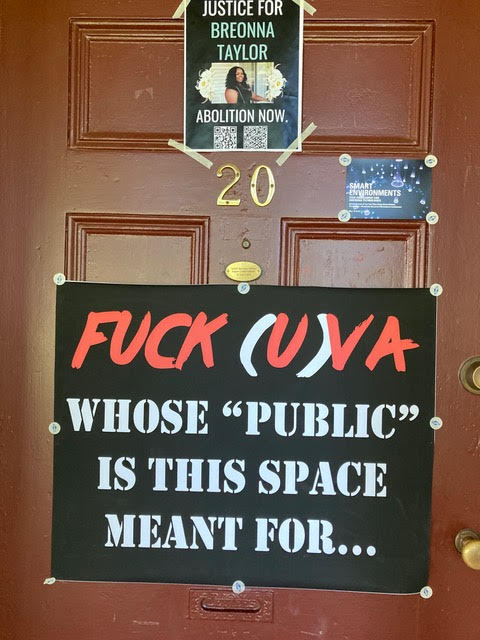
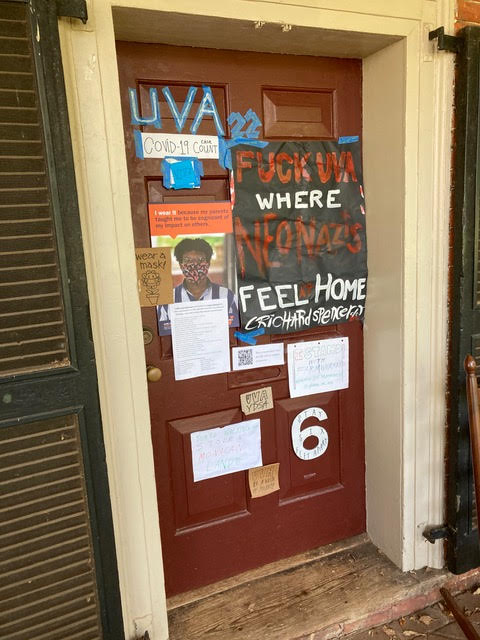
Ellis returned to the Lawn a week after requesting that the sign be taken down to see if Ryan had taken action. The sign was still there. As Ellis walked over to speak with the student who lived in the room, a young woman of Pakistani heritage, two University safety patrols trailed him. Later, Ellis said they told him they were supervising him to make sure he didn't remove the sign.
When the student answered her door, Ellis asked her why she felt the need to use obscenity to denigrate the college in violation of the contract she signed.
"Because this university was founded by a slave owner who raped his slaves and stole this land from the Mannikin Indians to build this university for rich white guys with slave labor," she said, according to Ellis. She then slammed the door in his face.
The university council had advised the administration that it could not force the girl to take down the expletive-laden poster because it would violate her First Amendment right, Ellis later learned. "I thought it was a landlord tenant right," Ellis adds. "But because the school had not vigorously enforced the signage rules in the past, they said they could not enforce them now."
A former Lawn resident himself and 1975 graduate of UVA’s Darden School of Business, Ellis is an entrepreneur in the media industry and the current head of an Atlanta-based venture capital firm. Given his success, Ellis said he feels he owes a debt of gratitude to his alma mater and its founder, Jefferson.
Now that Ellis' nomination to the UVA Board of Visitors is pending confirmation by the Virginia General Assembly, progressive student activists at UVA have resurrected this incident and others in an attempt to prove his bigotry and pressure the chamber to reject him. The state senate currently has 21 Democrats and 19 Republicans and, to Ellis’s knowledge, it rarely singles out appointees to be denied on a partisan basis. The vote is likely to be held in February or March, although there is no exact date yet, Ellis said.
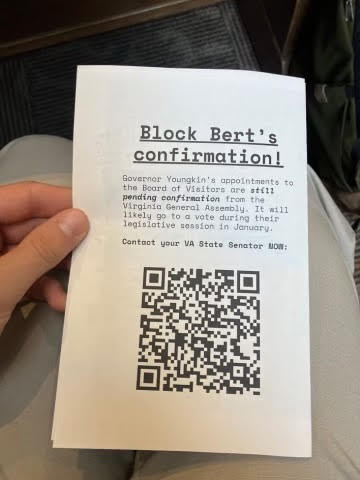
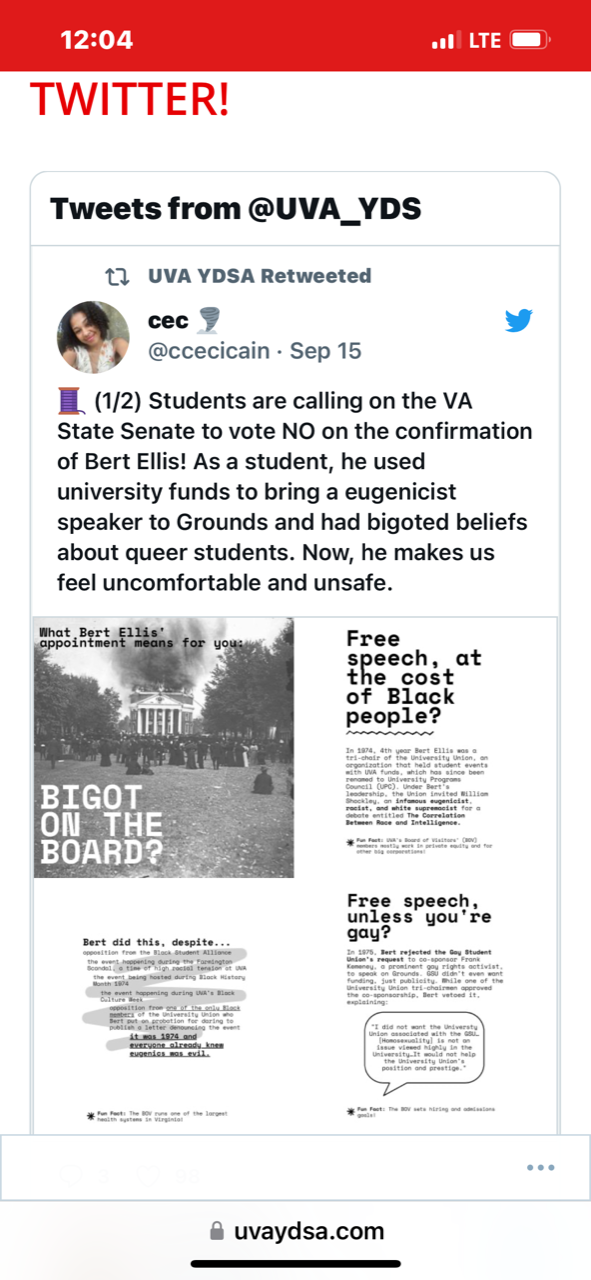
UVA’s student government, progressive student newspaper, and Democratic club have since launched what Ellis calls a smear campaign against him.
They all harped on a specific detail of the sign episode — the fact that Ellis brought a small razor blade to cut down the offensive parts — to portray him as a rogue vigilante who took matters into his own hands and infringed on the student’s privacy, he said.
In its statement, the University student council conflated Ellis with white supremacist murderers from history.
“From the bondage and abuse experienced by enslaved people, to the violent occupation by Nazis and KKK members, to Bert Ellis — the Lawn is no stranger to racist violence under the guise of ‘Jeffersonian ideals’ in order to maintain power for the white elite,” the group wrote.
On September 20, the group passed a resolution demanding the Virginia General Assembly deny Ellis’s confirmation to the UVA Board of Visitors. When asked for comment about the sign incident, it replied: “Signage is and was permitted outside Lawn dormitories. At the time of the ‘F*ck UVA’ sign incident, the only regulations on signage outside of Lawn dorms were size restrictions and established first amendment protections. Following this event, the policy has changed such that signage is only allowed on University-installed door panels.”
“The signage protections were affirmed by University Counsel in a letter to the governing Board of Visitors and University President, which makes clear that "the lawn resident's speech is protected by the First Amendment and cannot be forcibly removed,” it added.
In an editorial, the student publication Cavalier Daily slammed Ellis for his sign intervention and also for his criticism of the university’s expensive diversity, equity, and inclusion initiatives. It claimed Ellis “traveled across state lines to harass a Lawn room resident, arriving with a razor blade intending to cutaway sections of the sign hanging on her door that he did not agree with.”
While confirming that he did plan to carefully remove the sign and leave it outside her door, Ellis says the “racist” accusations make no sense because he had no idea the resident was a woman of color.
“It didn’t change my demeanor or anything else,” he said. “I was trying to have a conversation and learn what would cause one to attack the university like that.” While Ellis says he paid his own way into the school, UVA apparently gave her a full scholarship, he discovered later.
In addition to beating the sign-incident drum, members of the University Democrats went back almost 50 years to find what they believed to be another “gotcha” moment for Ellis.
The club suggested Ellis was racist because the university union he presided over between 1974 and 1975, which was responsible for organizing concerts, speeches, and other events, booked a debate between the co-inventor of the transistor William Shockley and African-American immunologist Richard Goldsby. Shockley helped pioneer the racist theory that black people are genetically inferior to whites. The Black Student Alliance and student council subsequently asked the union to cancel it, but they proceeded anyway.
“We disagreed with his premise and wanted it to be debated out in the open. So did Harvard. Harvard tried to book him to debate racial equity activist Roy Innis,” he says. “Goldsby absolutely tore Shockley apart. It was amateur hour. We all thought we had done a great service. His premise died with that debate.”
UVA’s liberal students have cast the story as “Bert Ellis books eugenicist,” he says, “but they’ve completely skipped the debate part.”
Last month, the Washington Post covered the dispute in an editorial.
Most recently, the student council at the University of Virginia called for the resignation of Bert Ellis, a Youngkin appointee on U-Va.'s Board of Visitors who had attacked the school's diversity, equity and inclusion initiatives — even traveling there with a razor blade to cut down a sign on a student's door that he regarded as offensive,” it said. “That was before a report by the U-Va. student newspaper, the Cavalier Daily, that Mr. Ellis, as an undergraduate in the 1970s, fought to bring a noted eugenicist to campus to air his pseudoscientific views that Black people are genetically inferior to Whites.
When asked for comment, the university council doubled down, arguing that Ellis should be disqualified from Board of Visitors consideration because of his role in hosting an academic debate. “In 1974, eugenics was disproven pseudo-science. Symbolically, the event represented the unnecessary platforming of a eugenicist. Materially, it meant that the University of Virginia paid a eugenicist $1,000 in student fee money to speak. The event was held during black culture week, in black culture month, over the wishes of black students at the University,” the council told National Review.
After the George Floyd social-justice riots, Ellis said UVA really dove into DEI initiatives. After those violent protests, Ellis says the administration created a racial-equity task force, which was asked to write a report on the state of the school’s DEI efforts. It assumed systemic racism at the college as a given, Ellis claims, without providing specific evidence to support that allegation. The report proposed a DEI program to the Board of Visitors.
One of Ellis’s personal projects as a current member of the Board of Visitors is to get to the bottom of the cost of the school’s DEI initiatives — a figure he says he’s still hunting for.
“Ellis has demonstrated an explicit will to attack the very principles we pride ourselves on as a community of trust and self governance. We believe this inability — or rather, this unwillingness — to respect the balance of power between the University and its students disqualifies him from consideration for a seat on the Board,” the Cavalier Daily wrote.
Yet, it clarified: “Let us be clear — we are not disagreeing with Ellis on an ideological basis.”
After witnessing first hand the concerted effort to tear down Jefferson’s legacy and desecrate the university he founded, Ellis and fellow alumni formed the Jefferson Council to preserve the architectural integrity of the Lawn, defend the Jeffersonian legacy, and restore rigorous debate and open dialogue as cornerstones of the institution.
"They're going after all of our founders," he said. Jefferson is obviously the primary target as he built the school in the 1800s, "but we're going to have to fight for James Madison, James Monroe, and George Washington."
| |||||||||||||||||||||||||||





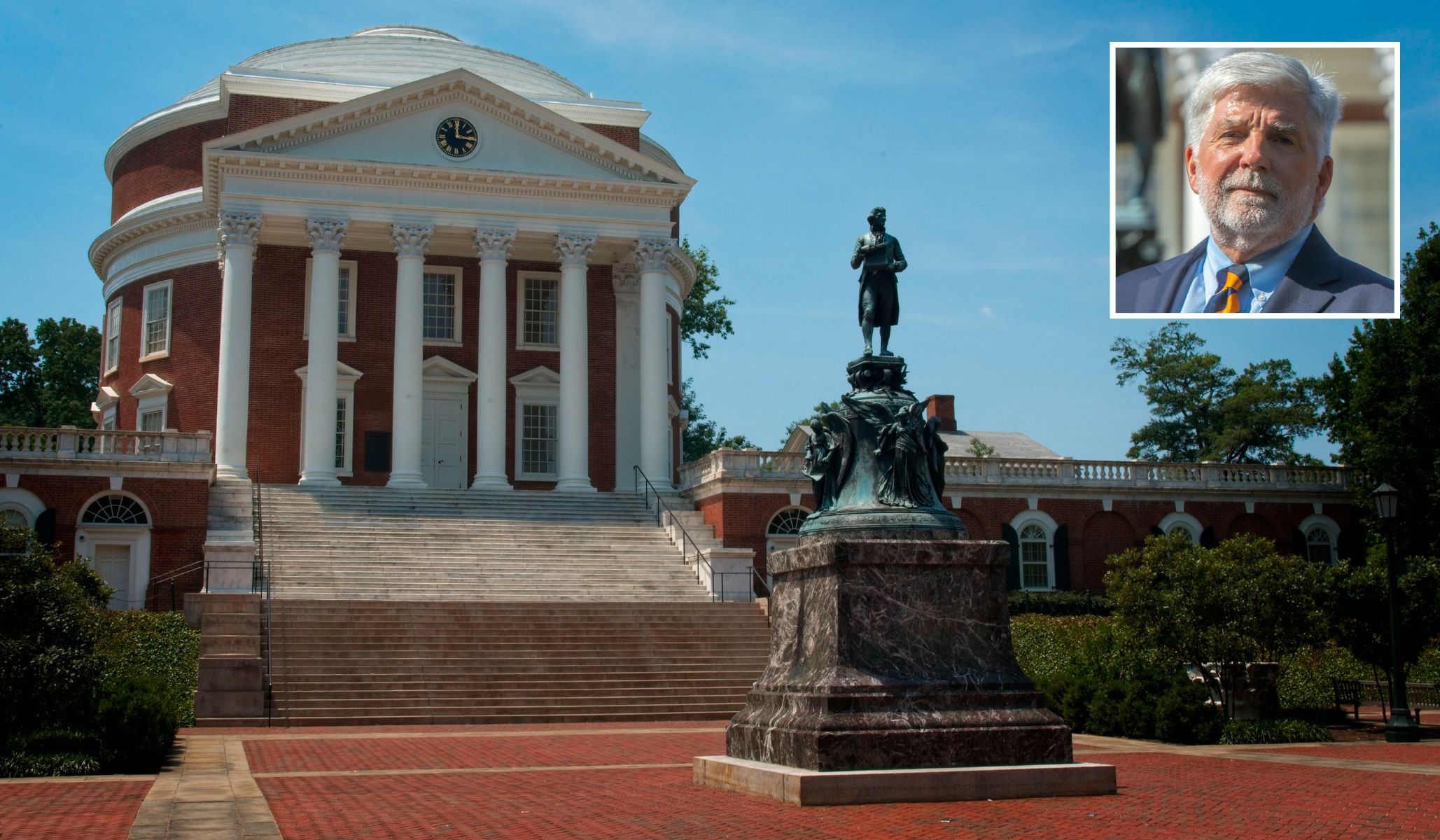







No comments: